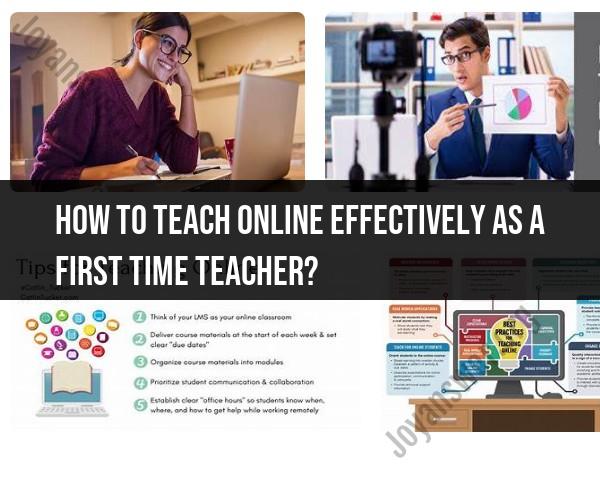How to teach online effectively as a first time teacher?
Teaching online effectively, especially for first-time instructors, involves adapting teaching strategies and embracing technology to create engaging and interactive learning experiences. Here are some tips:
Familiarize Yourself with the Technology: Spend time getting comfortable with the online platform or learning management system (LMS) you'll be using. Explore its features for conducting lectures, sharing materials, and engaging students.
Plan and Organize: Create a structured plan for your course, including learning objectives, a clear schedule, and organized content. Chunk materials into manageable modules or lessons for easier online consumption.
Engage Students Actively: Use various tools to engage students actively. Incorporate interactive elements like quizzes, polls, discussion boards, and group activities to encourage participation.
Clear Communication: Clearly communicate expectations, guidelines, and instructions for assignments, assessments, and participation. Use multiple communication channels (emails, announcements, forums) for clarity.
Use Multimedia and Visuals: Incorporate multimedia elements such as videos, infographics, and images to enhance understanding and maintain student interest. Visual aids can clarify complex concepts.
Provide Feedback and Support: Regularly provide constructive feedback on assignments and participation. Be available for questions and provide support through office hours, emails, or discussion forums.
Encourage Collaboration: Foster a sense of community by encouraging collaborative activities, group discussions, and peer-to-peer interactions. Utilize breakout rooms or group projects for collaborative learning.
Be Adaptable: Be prepared to adapt and adjust your teaching strategies based on student feedback and the online learning environment. Flexibility is key to meeting diverse student needs.
Accessibility and Inclusivity: Ensure course materials and activities are accessible to all students. Use accessible formats for content, provide closed captions for videos, and accommodate diverse learning styles.
Reflect and Improve: Reflect on your teaching methods regularly. Ask for feedback from students and use that input to improve your teaching strategies and the overall learning experience.
Starting as a first-time online instructor may feel challenging, but with preparation, engagement, and a willingness to adapt, you can create a dynamic and effective online learning environment for your students. Continuous improvement and a student-centered approach will contribute to your success as an online educator.
What are essential tips for first-time teachers to effectively conduct online classes?
Navigating the world of online teaching for the first time can be exciting and, let's be honest, a bit daunting. But fear not, new educator! Here are some essential tips for first-time online teachers to conduct effective and engaging classes:
Before the Class:
- Know your platform: Dive deeper than just the basics. Master features like screen sharing, polls, breakout rooms, and recording lectures. Practice beforehand to avoid technical hiccups during class.
- Plan engaging lessons: Tailor content for the online format. Incorporate multimedia elements like images, videos, and interactive exercises. Keep lessons bite-sized and interactive to maintain attention.
- Set clear expectations: Create a detailed syllabus or schedule outlining class structure, assignments, communication channels, and attendance policies. Communicate these clearly at the beginning of the semester.
- Establish classroom rules: Set expectations for online etiquette, participation, and communication. Address issues like background noise, microphone etiquette, and chat usage before diving into content.
During the Class:
- Be the energetic anchor: Your enthusiasm sets the tone for the class. Project your voice, maintain eye contact (through the camera!), and use your body language to keep students engaged.
- Variety is key: Don't lecture for the entire session. Mix things up with polls, quizzes, breakout room discussions, collaborative activities, and short video clips. Encourage student participation through questions, open forums, and live chats.
- Embrace technology: Utilize online tools like interactive whiteboards, online quizzes, and collaborative documents to make learning active and engaging. Don't shy away from exploring new digital resources to enhance your lessons.
- Build a learning community: Foster a sense of connection despite the physical distance. Encourage introductions, icebreakers, and online discussions to build rapport and a collaborative atmosphere.
- Be flexible and adaptable: Technical glitches, unexpected issues, and student questions can throw you off track. Stay calm, be flexible, and adapt your plans as needed. Remember, your ability to handle surprises makes you a great teacher.
After the Class:
- Provide timely feedback: Don't leave students waiting. Return assignments and quizzes promptly with detailed feedback to help them improve. Offer one-on-one sessions for personalized support.
- Stay accessible: Communicate effectively through announcements, emails, and online forums. Make yourself available for questions and concerns outside of class time.
- Refine and iterate: Reflect on your teaching and continuously seek feedback from students. Adjust your teaching methods, activities, and technologies based on your experiences and student input.
Remember, online teaching is a journey of exploration and continuous learning. By embracing these tips, staying flexible, and focusing on student engagement, you can navigate the online classroom with confidence and make a positive impact on your students' learning experience. Good luck!












